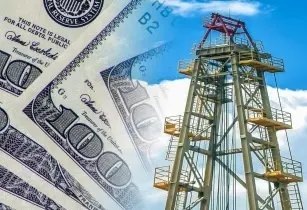In a bid to curb the raging inflation in Nigeria, the NNPC Ltd has sought the support of Afrexim Bank through a US$3bn Emergency Crude Repayment Loan
An official tweet by NNPC read: "The NNPC Ltd. and @afreximbank have jointly signed a commitment letter and Termsheet for an emergency $3billion crude oil repayment loan.
“The signing, which took place today at the bank’s headquarters in Cairo, Egypt, will provide some immediate disbursement that will enable the NNPC Ltd. to support the Federal Government in its ongoing fiscal and monetary policy reforms aimed at stabilising the exchange rate market.”
According to media reports, the interest rate of the loan may range from 8-11%.
Giving further insights into this loan agreement, Otega Ogra, senior special assistant to President Bola Ahmed Tinubu on digital and new media, explained in a tweet that it 'is not a crude-for-refined products swap but an upfront cash loan against proceeds from a limited amount of future crude oil production'. Speaking of risk factors involved, he assured that the exposure of NNPC Ltd covers just a fraction of their entitlements. The loan will be repaid against a fraction of proceeds from future crude oil production. It is a strategic move that ensures a balance between the country's current economic needs and future production capabilities. Laying out the procedure, he said that the funds will be released in stages or tranches based on the specific needs and requirements of the Federal Government.
This comes after the acting governor of the Central Bank of Nigeria (CBN), Folashodun Shonubi, informed that the apex bank will be taking steps to improve the liquidity in the foreign exchange market, which recently saw the dollar exchange for as low as N950/$ in the parallel market and N775 in the official window. This did not helpNigeria’s massive fuel importation that takes up about US$20bn yearly, raising the price to unprecedented levels, with no sign of dropping anytime soon, given the skyrocketing value of dollars.
Cutting down petrol subsidy has only worsened inflation woes as domestic fuel prices more than doubled. Transport price rose notably, increasing from 24.8% y/y in June to 26.3% y/y in July. Core inflation (excluding farm produce) increased to 20.8% y/y in July from 20.3% y/y in June.
While addressing the nation on 31 July, Tinubu said the government is especially vigilant of the rise and fall of exchange rates and inflation in premium motor spirit (PMS) aka petrol prices to intervene if and when necessary. “We are also monitoring the effects of exchange rates and inflation on gasoline prices. If and when necessary, we will intervene. I assure you, my fellow countrymen and women, that we are exiting the darkness to enter a new and glorious dawn,” he had said.
The NNPC-Afrexim development might have contributed to a slight relief in the forex market as the naira appreciated at both the official investors’ and exporters’ (I&E) forex window and the parallel market. But with inflation kicking in across sectors from food price inflation to non-food price inflation, the longevity of this development remains to be seen.
Meanwhile, Phrank Shaibu, the special assistant on public communication to former Vice President of Nigeria, Atiku Abubakar, has reduced the loan announcement to a mere cosmetic move. He raised question as to why the NNPC, which claimed to be a profit-making organisation, would bother taking loan for the primary purpose of stabilising the naira. “If the NNPCL was a publicly listed oil firm like Aramco and Mobil, would it obtain a loan in order to ‘defend the naira’?”








